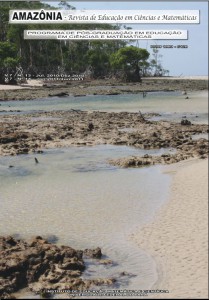Science and science education: Ideas and practices of science teachers in high school in Cambina/Angola
DOI:
https://doi.org/10.18542/amazrecm.v7i0.1693Keywords:
teachers, science education, Science-Technology-SocietyAbstract
In this article, we present an outline of a qualitative research approach in narrative, developed with high school science teachers in the province of Cabinda, Angola. The school in which the twelve professors involved it this research work, is intended to prepare teachers in high school, to work in school until the 8th grade. In objective terms, we seek to reflect and understand, from written records of science teachers in this educational institution, which ideas they construct about science and science teaching that guide their teaching practice, since most of them teaches at high school in an area for which they were not graduates. They are teachers coming from related fields such as engineering, nursing, biochemistry and others have only a high school degree. We implemented a qualitative research, adopting a narrative approach, in an (auto) biographical perspective. We seek the information necessary for the construction of the data from questionnaires completed by teachers. The results point to the predominance of the rational idea of science and teaching by transmission, though it was identified evidence of understanding of teaching as construction, and the relationship of science with components of Science, Technology and SocietyReferences
CHASSOT A. Alfabetização CIENTÍFICA questões e desafios para a educação. Unijuí, Rio Grande do Sul, 2003.
CALEY, C. Contribuição para o pensamento Histórico e sociológico Angolano (intervenções e reflexões) Nzila, Luanda -2006.
CONNELLY, F. M; CLADININ, D.J. Relatos de Experiência e Investigacion Narrativa. IN: LAROSSA, J. Dejame que te cuete: Ensayos sobre narrativa y educación. Barcelona Laertes, 1995.
CHAVES, S. Por uma epistemologia da formação docente: o que diz a literatura e o que fazem os professores. IN: SCHHNETZLER, R. & ARAGÃO, R. M. R: UNIMEP/CAPES Campinas, 2000.
DWECK, D. Angola Agora é um Bom Negócio. IN: Revista Exame Edição 877. Ano 40. Nº19 2006.
GOLDENBERG, M. A arte de pesquisar: como fazer pesquisa em ciências sociais. Recorde:Rio de Janeiro 1999.
JOSSO, M. C. Experiências de Vida e Formação. Trad. de José C. e Júlia F. São Paulo, 2004.
MORIN, E. Ciência com consciência. Trad. Portuguesa de Maria Gabriela de Bragança e Maria da Graça Pinhão. Portugal: Publicações Europa-America, Lda, 1994.
MORIN, E. A cabeça bem-feita: repensar a reforma, reformar o pensamento. Rio de Janeiro: Bertrand Brasil, 2003.
McEWAN, H. & EGAN, K. La Narrativa em La Enseñanza, El aprenizaje y La investigación. Argentina: Amorrortur ed,1995.(Coleccion Agenda educativa)
JOSÉ, M. A utopia de Edgar Morim: da complexidade à concidadania planetária. Ijuí: Unijuí,2002.
PRIGOGINE, I. O Fim das Certezas: Tempo, Caos e as Leis da Natureza. UNESP: São Paulo. 1996.
SILVA, R ; ZANON, L. Ensino de ciência e cidadania. IN: SCHHNETZLER, R. P. & ARAGÃO, R. M. R: UNIMEP/CAPES Campinas, 2000.
SCHÖN, D. La formación de profissionales reflexivos: hacia um nuevo diseño de la enseñanzay el aprendizaje em la profesiones. Paidós: Barcelona, 1992.
SANTOS, E. & PRAIA, J. Percurso de mudança na didática das ciências. Sua Fundamentação Epistemlógica. Aveiro: Portugal 1992.
VALE, J. Questões atuais no ensino de ciências. IN NARDI, R.(org), escrituras: São Paulo.1998.



